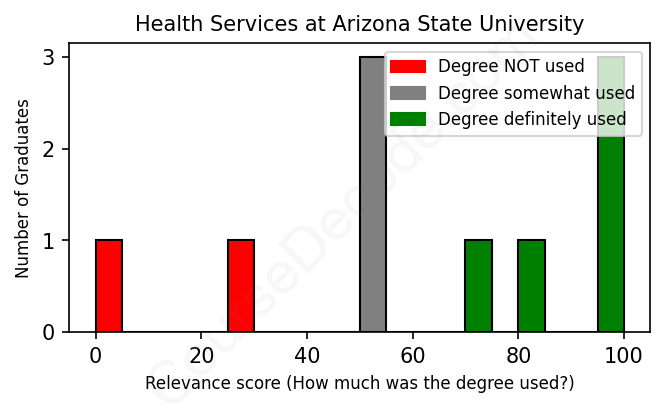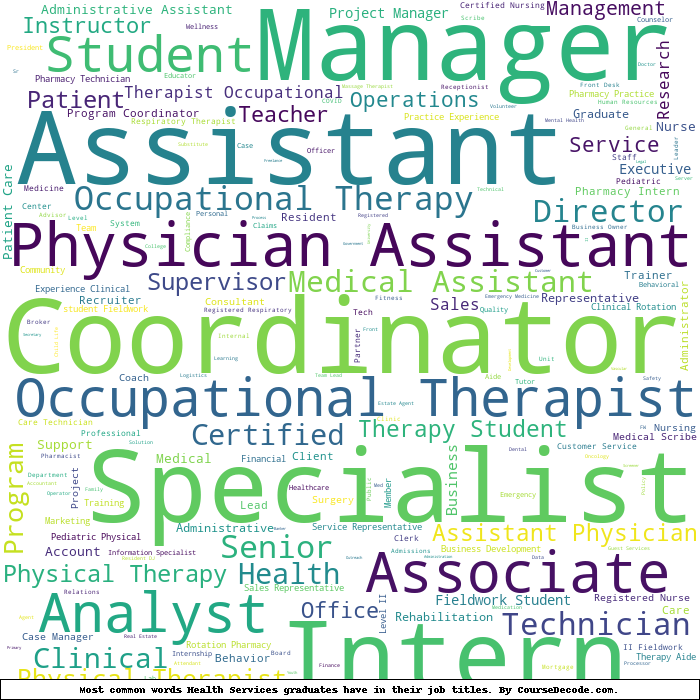
First, some facts. Of the Health Services graduates from Arizona State University we've analyzed , here's how many have used (or NOT used) their degree in their career:

These are estimates based on AI analysis of 10 LinkedIn profiles (see below).
The verdict? Slightly below average. Overall, with an average relevance score of 62%, Health Services graduates from Arizona State University have a slightly lower likelihood (-5%) of finding work in this field compared to the average graduate across all fields:
And for comparison, here's the chart for all profiles we've looked at across all degrees.
Also, after graduating, only 30% of these graduates have pursued further education other than another Bachelor's degree (such as a Masters degree or other), compared to the average across all profiles of 35%. This suggests a Bachelors degree is enough for most Health Services graduates, and it's normal to look for work straight after graduation.
See the details:
|
Relevance score: 100% We think this person has gone into a career highly relevant to their degree. We think this person has gone into a career highly relevant to their degree.
DEGREE INFOGraduated in 2023 from Arizona State University with a Bachelor of Applied Science - BASc in Health Services. No other secondary education since. JOB HISTORY SINCE GRADUATIONCertified Phlebotomy Technician Clinical Pathology Laboratories Apr 2024 - Present ABOUTAs a Phlebotomist and Laboratory Technician within various healthcare organizations over the past several years, I have learned a great deal in patient service, prioritization, and active listening-among many other things. At this point in my life I am looking to really excel in the right opportunity that is patient facing and customer service driven in a team environment where I can incorporate what I have learned and what I will learn to be an asset to my team. |
The top 10 most common jobs done by the graduates we've analyzed (ranked most common to least) are:
Looking at the jobs held by graduates from Arizona State University with a degree in Health Services, we see quite a mix. Many individuals have landed roles directly linked to health services, such as Family Medicine Resident, positions at Phoenix Children's Hospital, and roles within healthcare operations that require an understanding of health policies and client relations. These positions show a strong connection to the core knowledge and skills learned during their degree. On the other hand, there are a fair number of roles like Administrative Assistant, Notary Public, or guest teaching that are not closely related to health services. While these jobs might use some interpersonal skills or organizational abilities, they don't directly involve medical or healthcare expertise.
Overall, it appears that a significant chunk of graduates is heading into relevant healthcare roles that leverage their education, especially in clinical settings or health operations. However, there is a notable portion that veers off into unrelated fields—like teaching, retail management, or even security—that don’t tap into the specialized knowledge from their health services background. So, while there's a solid trend toward health-related positions, many graduates are also finding themselves in jobs that skirt the edges of their degree's relevance. It’s a mixed bag, but definitely more leaning towards health services than away from it!
Here is a visual representation of the most common words in job titles for Health Services graduates (this is across all Health Services graduates we've analyzed, not just those who went to Arizona State University):

Looking at the career trajectories of Arizona State University Health Services graduates, you can see a mix of paths—some stick closely to healthcare roles, while others venture into different areas. For many graduates, their first jobs seem to be stepping stones related to health services. For example, recent graduates have taken on roles like Medical Scribe, Administrative Assistant at hospitals, and various positions in clinics, illustrating how many start in supportive or entry-level healthcare positions. This makes sense—those initial jobs can offer valuable experience and help build a network in the health services field.
As time goes on, we see a combination of progression within the healthcare sector and some shifts into different roles. In about 5 to 10 years, many graduates have moved into management roles, like Practice Manager or Operations Business Partner, particularly in clinics or healthcare organizations. However, there are also some who have diversified their careers quite a bit, ending up in unexpected areas such as business operations at large companies like Amazon, or starting their own businesses. While some have stuck to the health services track, showing that graduates can channel their education into meaningful, relevant careers, others have taken a wider approach, leading to varied career outcomes. Overall, it seems like the degree has given many a solid foundation, but the path afterward can vary significantly based on individual choices and opportunities.
Honestly, a Bachelor’s degree in Health Services can be a mixed bag in terms of difficulty, but it's generally considered to be on the easier side compared to more rigorous STEM programs. You’ll cover a lot of important topics related to health care, policy, and administration, which involves some reading and writing, but the coursework tends to be more about understanding concepts than heavy math or science. At Arizona State University, you’ll have access to good resources and support from professors, making it easier to keep up with the material. If you're organized and willing to put in the effort, you'll probably find it manageable, especially if you have a genuine interest in health and helping others. So, if you’re looking for something that challenges you but isn’t super intense, this might be a solid choice!
Most commonly, in the LinkedIn profiles we've looked at, it takes people 2 years to finish a Bachelor degree in Health Services.
Looking at the job paths of these Health Services graduates from Arizona State University, it seems like they’ve had a mix of experiences, with some likely earning decent money while others might still be figuring things out. For instance, those working at places like Phoenix Children's Hospital or in management roles at Gawley Companies probably earn more than average—especially if they work their way up into higher positions. However, some like the graduate who became a nanny or a guest teacher might not be pulling in big bucks just yet, especially if they're at the start of their careers or working part-time jobs. So overall, while there are definitely graduates who seem to be on the right track financially, others might want to dive into more lucrative roles or gain additional experience to boost their income.
Here is a visual representation of the most common words seen in the "about" section of LinkedIn profiles who have a Bachelor degree in Health Services (this is across all Health Services graduates we've analyzed, not just those who went to Arizona State University). This may or may not be useful:

Here are all colleges offering a Bachelor degree in Health Services (ordered by the average relevance score of their Health Services graduates, best to worst) where we have analyzed at least 10 of their graduates:
| College | Score | Count |
|---|---|---|
 The Ohio State University The Ohio State University
|
88 | 14 |
 Quinnipiac University Quinnipiac University
|
88 | 10 |
 Grand Valley State University Grand Valley State University
|
87 | 16 |
 University of Tampa University of Tampa
|
87 | 10 |
 Stony Brook University Stony Brook University
|
80 | 15 |
 Boston University Boston University
|
79 | 12 |
 University of Connecticut University of Connecticut
|
78 | 26 |
 Florida Agricultural and Mechanical University Florida Agricultural and Mechanical University
|
76 | 12 |
 Texas A&M University Texas A&M University
|
72 | 16 |
 University of South Florida University of South Florida
|
72 | 26 |
 Boise State University Boise State University
|
71 | 11 |
 University of Central Florida University of Central Florida
|
68 | 47 |
 Florida Gulf Coast University Florida Gulf Coast University
|
68 | 10 |
 James Madison University James Madison University
|
66 | 26 |
 University of Missouri-Columbia University of Missouri-Columbia
|
66 | 17 |
 California State University, Fullerton California State University, Fullerton
|
66 | 13 |
 California State University - East Bay California State University - East Bay
|
66 | 10 |
 Arizona State University Arizona State University
|
62 | 10 |
 Cleveland State University Cleveland State University
|
60 | 10 |
 Stockton University Stockton University
|
58 | 12 |